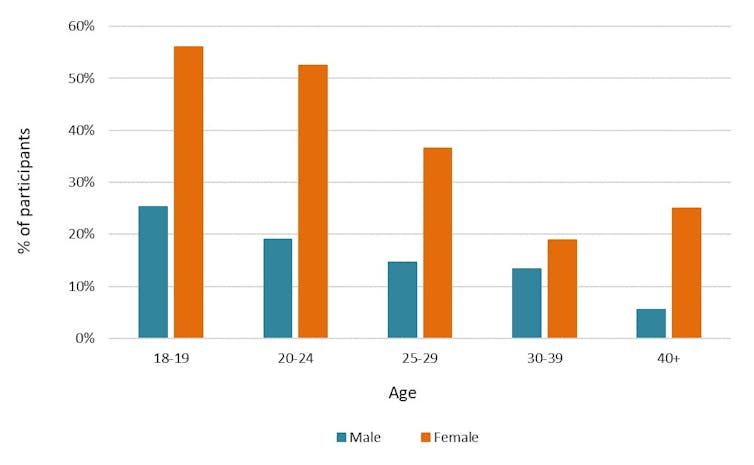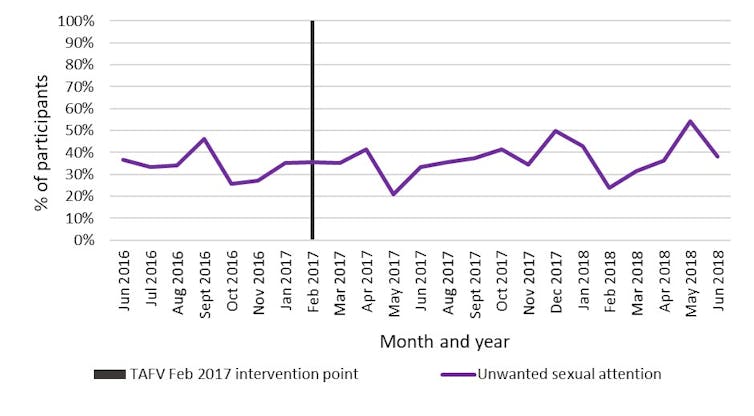A disturbingly high proportion of young people, particularly women, experience unwanted sexual attention in entertainment districts across Queensland.
This is the bad news from a two-year, of the Queensland government’s 2016 “Tackling Alcohol-Fuelled Violence” (TAFV) policy (the good news included a ).
One in three patrons reported unwanted sexual attention – including harassment, unwanted touching, or sexual gestures – in or around a licensed venue in the preceding three months. Among those who reported unwanted sexual attention, two in three women (68 per cent) also reported physical and/or verbal aggression.
The rate of unwanted sexual attention was highest for young women (ages 18-24). More than 50 per cent had experienced this harm in the previous three months, as the chart below shows. Proportion of patrons in Cairns, Fortitude Valley and Surfers Paradise entertainment districts who experienced unwanted sexual attention in the 3 months prior, by sex and age category.
Proportion of patrons in Cairns, Fortitude Valley and Surfers Paradise entertainment districts who experienced unwanted sexual attention in the 3 months prior, by sex and age category.

In the Fortitude Valley entertainment district, a staggering one in four reported unwanted sexual attention on the night they were interviewed (26 per cent of 262 female patrons interviewed and followed up the next day).
Over the two-year evaluation, 4,055 patrons (43 per cent female) were interviewed on Saturday nights on the streets of three entertainment districts – Cairns, Fortitude Valley (Brisbane) and Surfers Paradise (Gold Coast).
While the rates fluctuated over time in these areas, the rate of unwanted sexual attention didn’t change when comparing the months before and after the TAFV policy took effect. The chart below shows the trend for Fortitude Valley. Proportion of patrons in Fortitude Valley entertainment district who experienced unwanted sexual attention by month and year (June 2016 – June 2018).
Proportion of patrons in Fortitude Valley entertainment district who experienced unwanted sexual attention by month and year (June 2016 – June 2018).

Uncomfortable truths
These findings highlight some uncomfortable truths.
First, the unwanted sexual attention young women experience in the night-time economy is an intransigent and safety problem.
Third, overcoming the problem requires discussion beyond alcohol accessibility and drinking practices.
The findings of the evaluation sit against a backdrop of increasing global intolerance of the sexual abuse and harassment of women. For example, the number of women reporting sexual assault to Queensland Police has . This increase might be attributable to the raising of public consciousness (e.g. ).
Such awareness-raising has had impacts on broader social norms around sexual aggression towards women. But the evaluation suggests this messaging has largely failed to permeate the social norms of the night-time economy.
Why haven’t nightlife norms changed?
Understanding and addressing the mechanisms behind unwanted social attention in this context is particularly challenging. In addition to the broader social norms, licensed venues have their own cultural norms – including sexualised environments and heavy drinking – that often .
Recent experimental research suggests unwanted sexual attention in these settings may be related to males misperceiving the social environmental cues. They read , by females as signs of sexual interest. They might have been influenced by decades of sexualised alcohol marketing.
Such research highlights the need to better understand the risk and protective factors affecting victims and perpetrators of sexual aggression, and how these factors interact with cues in the physical environment.
Responsibility is broadly shared
These findings have many implications for policy and practice.
For a start, many experiences of unwanted sexual attention sit beyond the boundaries of the law. This raises a number of questions. Who is responsible for acting on unwanted sexual attention in and around licensed venues? And is it time to reassess the in entertainment districts?
One strategy that attributes some responsibility to venue staff has been trialled in cities such as London, Chicago, Vancouver and Melbourne. The aims to train and empower licensed venue staff to act as capable guardians (instead of bystanders) who intervene in incidents of unwanted sexual attention. While theoretically such approaches are promising, the evidence for such targeted strategies remains limited.
The pervasive problem of unwanted sexual attention in night-time economies also requires attention from local and state governments. Strategies that specifically address this harm should be embedded in alcohol policy.
Without a more sophisticated approach that targets all types of aggression, young women will likely continue to experience high rates of unwanted sexual attention on their nights out.
This is is the third in a discussing a of the Queensland government’s and the implications for liquor regulation and the night-time economy in Queensland and Australia. A is also available.
Dominique de Andrade is a justice-health researcher.
Cheneal Puljevic is a Research Fellow, Centre for Health Services Research, The University of Queensland.
Kerri Coomber Research Fellow, Deakin University.
Peter Miller is a Professor of Violence Prevention and Addiction Studies, Deakin University

